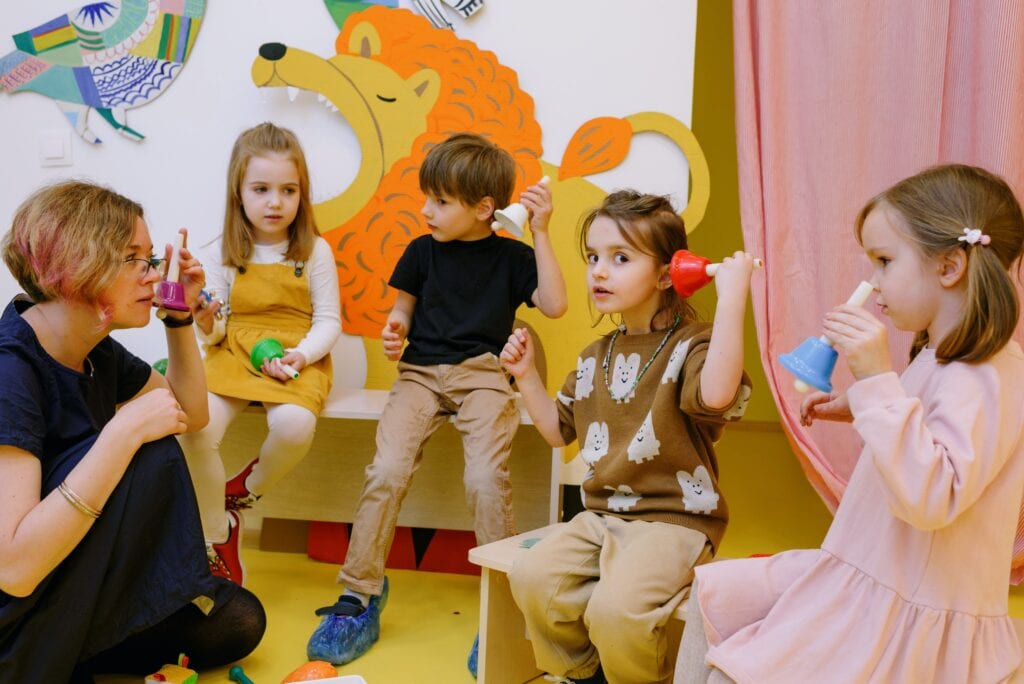While dyslexia is commonly thought of as a reading impairment, it also has an impact on a child's communication and social skills. Dyslexia can impair a child's ability to engage with peers and behave correctly in social situations because it interferes with the capacity to recollect words rapidly. A dyslexic individual who has difficulty finding words may struggle with expressive language. In addition to your challenges with both reading and writing, this has a social consequence that makes you feel bad about yourself.
Children with dyslexia frequently get upset and ashamed of their failure to learn to read, and the inference that they are both lazy or unintelligent, at least until they are identified. A large part of our work with dyslexic children is to help them find that they are capable and intelligent since they have lost faith in themselves.
If you're looking for a grammar school that prioritises academic rigour and character development, you've found it. Contact us today to learn more about our program and secure a spot for your child.
The Effects of Dyslexia on Social Skills
Dyslexia makes reading and spelling difficult, but it can also have an impact on social skills. Here are some of the most frequent social obstacles that persons with dyslexia may face—and how you may help.
Not Getting the Joke
The dyslexia connection: Struggling readers may not read as much as others. As a result, they may not be exposed to as many words and the many ways individuals use them. As a result, individuals may struggle to understand idioms or puns.
Look for methods to improve your vocabulary and wordplay.
Trouble Finding the Right Words
The dyslexia connection: People with dyslexia may struggle to find the words they want to say, especially if they are passionate about the subject or need to answer fast.
How you can assist: Allow time for reflection and processing. Reduce the overall speed of the talk.
Missing Social Cues
People with dyslexia may have difficulty reading nonverbal cues, facial gestures, and other social clues.
How you can assist: Turn down the volume on your favourite show. Discuss how the characters' body language reflects their emotions.
Trouble Messaging Friends
People with dyslexia may avoid texting because they struggle to understand the acronyms.
How you can assist: Explain how the abbreviations function. Some are based on spelling ("idk" for "I don't know"), while others are based on how letters and digits sound ("l8r" for "later").
Remembering Things Wrong
Dyslexia can make it difficult to recall certain words or information. This can lead to misunderstandings regarding what friends have stated.
How you can assist: Play the games that can help you improve your memory. For example, name the various types of cars on the street and then repeat those names a few minutes later.
What Causes Dyslexia To Be Discouraging And Frustrating?
Children with dyslexia are frequently frustrated by their failure to satisfy expectations. Their parents and teachers perceive a bright, active youngster who is not able to read or write. People with dyslexia and their families are frequently told, "He's such a brilliant child; if only he would try more." Surprisingly, no one knows how hard the individual with dyslexia is trying.
Only dyslexics' inability to attain their goals is more painful than not meeting other people's expectations. This is especially true for those who establish perfectionistic aspirations in order to cope with their worry. They grow up feeling that it is "awful" to make a mistake.
However, their learning handicap nearly guarantees that these youngsters will make several "careless" or "dumb" errors. This irritates them greatly because it makes them feel perpetually incompetent.
People with dyslexia frequently struggle with social relationships. These can be linked to the following factors:
- In comparison to their peers, dyslexic children may be socially and physically immature. This can result in a negative self-image and reduced peer acceptability.
- Because of their social immaturity, dyslexics may feel uneasy in social situations.
- Many persons with dyslexia struggle to read social cues. They may be unaware of the amount of personal space required in social encounters, or they may be indifferent to other people's body language.
- Dyslexia frequently impairs spoken language ability. Affected people may struggle to find the correct words, stammer, or pause before answering direct enquiries. This disadvantages them as they enter puberty, when language is becoming more important in their connections with peers.
People with dyslexia may have difficulties recalling the order of events in the same way that they have problems remembering the letter sequence or words. Take, for example, a typical playground exchange between two youngsters. A dyslexic child steals a toy from another child, who addresses the person with dyslexia by name. The dyslexic youngster then attacks the other child. The child usually may flip the sequence of events when relating the experience. He may recall the other child calling him a name, and then grabbing the item and hitting the other child.
There are two significant challenges this creates for the dyslexic kid. To begin with, it takes someone longer to gain wisdom from experience. Second, the dyslexic child appears to be lying if questioned by an adult who witnessed the events.
Sadly, most relationships between kids entail 15–20 separate occurrences. The individual with dyslexia may retell the story in a different order each time due to difficulties with sequencing and remembering. Everyone who has worked with him has come to the same conclusion: he is either crazy or a pathological liar.
Dyslexia is a learning disability that causes significant difficulties in a child's education and daily life due to its inconsistencies. The students' levels of skill show a wide range. While everyone has both strengths and limitations, common perceptions of dyslexia are greatly overstated. What's more, the dyslexic's advantages and disadvantages may go hand in hand.
Because of these extremes, people with dyslexia experience a "roller coaster" effect when reading. There are instances when individuals can perform things that are beyond the capabilities of their peers. They may be able to complete one activity one minute, and then be presented with something they simply cannot do the next. "Walking through dark holes" is a common expression among those who struggle with dyslexia. A deep comprehension of one's learning handicap is essential for dyslexics facing such challenges. This will aid in forecasting both their success and their failure. It's not just that people with dyslexia struggle to read consistently; they also struggle to perform consistently within activities. In other words, they make the same kinds of mistakes over and over. On each occasion, though, he spelt it incorrectly in a unique way. This variation makes it harder to implement fixes.
Last but not least, the dyslexics' productivity fluctuates throughout the day. Sometimes understanding what you read will come easily, and sometimes it won't. On another day, though, they might be unable to even sign their own name. The individual with dyslexia and those around him experience great confusion as a result of this inconsistency.
Intermittent impairments are rare in comparison to other types of disabilities. Most medical professionals would call it hysteria if a youngster who needs a wheelchair stays in it even though he or she can walk on some days. Still, for a person with dyslexia, results are inconsistent. Without being able to anticipate the severity of the symptoms on any given day, it is very challenging for the person to learn to compensate.
How Does A Dyslexic Person Feel?
Dyslexic children experience significant academic challenges, particularly in reading, spelling, and handwriting. Dyslexic children have additional emotional difficulties, such as aggression, anxiety, and sadness. However, the disorder's negative repercussions cannot be considered without also taking into account the social challenges caused by dyslexia.
Anxiety
Anxiety is the most frequently reported emotional ailment among dyslexic people. Because of their ongoing irritation and uncertainty at school, people with dyslexia grow afraid. Dyslexia's inconsistencies enhance these feelings. Entering new settings can be incredibly stressful for them since they anticipate failure.
Anxiety causes people to avoid things that scare them. Dyslexic people are no exception. Many teachers and parents, however, misunderstand this avoidant attachment style as laziness. The dyslexic's reluctance to engage in school activities like homework is due to fear and confusion rather than disinterest.
Anger
Many of dyslexia's psychological effects stem from the disorder's sufferers' inability to cope with academic or social challenges. Anger is a common emotional response to frustration, according to social scientists. As a result, many people with dyslexia exhibit this characteristic.
One might imagine a dyslexic being quite frustrated with their education and the people responsible for it. Another common symptom of dyslexia is anger directed at one's parents. The dyslexic's rage is most likely to be felt by the mother. As a result, the kid is usually quite subdued and quiet in class. Once he returns to the familiarity of home, though, these explosive emotions typically surface and are directed at his mother. The child's confidence in his mother is ironically what permits him to express his frustration. However, for the parent who is trying to help their child, this can be quite irritating and perplexing.
Teenagers are held to a higher standard of self-sufficiency than younger children. Children experience profound inner tensions as they try to reconcile the pressure to be independent with their own history of dependency. The teen dyslexic learns to control his rage in order to distance himself from the people he has come to rely on.
As a result of these difficulties, it may be challenging for parents to aid their dyslexic adolescent. Instead, the child might benefit more from an intervention from a peer tutor or a concerned young adult.
Self-image
A dyslexic's sense of identity appears to be highly susceptible to stress and disappointment. Every kid, according to Erik Erikson's theory of the seven stages of development, struggles during the elementary school years between developing a healthy sense of self-worth and a pervasive sense of inferiority. If kids do well in class, they'll feel good about themselves and believe they can achieve everything they set their minds to.
When kids experience setbacks and disappointment, they learn that their efforts are pointless and that they are superior to those of their peers. They learn that their surroundings dictate their actions and moods rather than the other way around. They're totally helpless and they know it.
When questioned by researchers, normal students almost always say that they themselves are to blame for any achievements. In the face of setbacks, they tell themselves to dig deeper. When a person with dyslexia achieves achievement, he is more likely to credit his good fortune. After a setback, he labels himself as incompetent.
Studies have shown that inferiority complexes emerge by the time children are ten. It's really challenging to foster healthy self-esteem in a youngster after this age. This provides strong support for intervening early.
Depression
Dyslexia often has psychological consequences, such as depression. Although most people who are dyslexic do not suffer from depression, kids with this learning problem are more likely to experience profound sadness and despair. People with dyslexia, perhaps due to their low self-esteem, redirect their rage inwards rather than outwards.
Depression in children and adolescents, however, often presents itself in ways that are distinct from depression in adults. The depressed youngster probably won't be sleepy or withdrawn. On the other hand, he or she may become more busy or misbehave in order to bury their emotions. The youngster may not appear sad if they are suffering from disguised depression. However, there are three commonalities between sad children and adults:
- To begin with, they have a poor opinion of themselves.
- Additionally, they have a pessimistic outlook on life. It's less likely that they'll have a good time in life. It's tough for them to relax and enjoy themselves because of this.
- In conclusion, most unhappy children and teens have a hard time envisioning a bright future for themselves. The dyslexic with depression not only has a hard time dealing with the difficulties he's facing right now, but he also expects to have a hard time for the rest of his life.
Family problems
The effects of dyslexia on a child's family are substantial, as is the case with any disability. Since dyslexia is a non-visible disability, its consequences are frequently disregarded.
Dyslexia has far-reaching consequences for loved ones. Sibling competition is a prime example. Since parents tend to focus on the dyslexic child and provide them with more resources than their other children, the latter often feel resentful of their parents' attention. The irony is that the dyslexic kid doesn't want all the extra help. This raises the odds that he or she will take unfavourable action against any high-achieving offspring.
Dyslexia in children tends to be genetic. That suggests that the child's educational struggles may have a genetic basis, with either or both the parents experiencing difficulties of their own. There are two possible responses for dyslexic parents when their child is having difficulties at school. Some people may refuse to accept the reality of dyslexia and insist that with enough effort, any youngster can achieve success. In other cases, parents might relive their own disappointments and stresses in the context of their child's school life. The adult's ability to parent may suffer as a result of the resurfacing of intense and frightening feelings.
Research shows that children with dyslexia are at a heightened risk of being bullied and socially isolated because of the issues they have in school, such as appearing introverted or losing interest in studies. When a child doesn't understand why they need to work so hard at something that other kids seem to breeze through, it can be devastating to their sense of self-worth. Recognizing the issue and putting measures in place to aid the dyslexic child in overcoming their unique challenges can have a profoundly positive impact.
However, there are positive aspects of dyslexia as well; many persons with dyslexia have exceptional spatial or 3D awareness and go on to successful careers as engineers. People with dyslexia are highly represented in high-level positions at organisations like NASA and the British intelligence agency GCHQ; therefore, no career path is off-limits.
Top Tips for Parents:
- Have a conversation with your kid about what they did or how they feel. Research indicates that expanding one's vocabulary has a significant effect on scholastic achievement.
- Instead of fixating on your child's problems, try to see him or her as a whole person. If you want them to feel good about themselves, you should encourage them to participate in activities where they excel.
- Be sure that homework doesn't turn into a battlefield. It's better to read one page or practise one word every day than to do nothing at all.
- One can use either a whiteboard or plastic letters to learn spelling. You should look for enjoyable ways to do it.
- Books aren't the only option for reading material. Play matching or paired-off games using word cards, or use them to build sentences. Don't make your kid think of it as a necessary evil.
- While you're out shopping, have your kid read off the list or some of the signage. We are surrounded by words; make use of them..
- If you have any worries, bring them up with the school. If you and the school work together, you'll be able to respond to any issues more efficiently.
- Forgetting essential items like books, kits, pencils, etc., because of poor self-organization is a common problem. Motivate your kid to establish some regular habits. What about swimming tomorrow? – Make sure everything is set up and ready to go for tomorrow.
- Promote the use of aids that can help you remember things, like checklists, "to do" lists, and academic planners. It's possible that a large whiteboard or chalkboard may serve as a family calendar.
- Keep in mind that reading and spelling are abilities that, just like any other talent, improve with consistent practice. As with football, swimming, and tennis, being a top athlete requires a lot of practice and commitment.
Because of the difficulties they face in school, dyslexic youngsters may begin to doubt not only their own intelligence but also their own worth and value. Children's self-esteem might take a hit and even disappear if they lack confidence in themselves. A dyslexic child will find it extremely challenging to socialise and establish friends in such an environment. Teachers may observe a dyslexic student sitting alone at lunch or watching from a distance as other children play, bringing attention to the child's inability to participate in social activities as a result of his or her reading disability.
When children feel frightened or intimidated, as dyslexic children sometimes do when they are made to read aloud in class, they can become hostile and even antisocial. A youngster who struggles with dyslexia may experience emotional outbursts if they are already feeling overwhelmed by the intellectual expectations of school. The social challenges that come with dyslexia are exacerbated when the person acts in a way that alienates their peers and possibly even their teachers.
The irritation of a kid who is dyslexic is often misunderstood by teachers and other educational professionals, who may then characterise the youngster as disobedient and anti-social. Some schools may not equip their teachers with the tools they need to properly assist students with learning disabilities, which can lead teachers to feel frustrated with a child even when they are aware that the student has a disability such as dyslexia. When a kid with dyslexia receives criticism from adults, it can set off a downward spiral in which the youngster becomes even more disheartened, irritated, or angry, which in turn leads to more criticism from adults.
Having the backing of everyone involved in the dyslexic child's schooling is crucial to reverse the social challenges that arise as a result of the learning disability. A complete programme to treat dyslexia symptoms as well as provide educational, social, and emotional support should be developed by teachers and other educational experts, parents, therapists, and the dyslexic child working together. In addition to helping with reading, addressing the underlying causes of dyslexia will have a positive impact on the individual's ability to socialise and emotionally as well.
FAQs About Dyslexia
This can lead to awkwardness and discomfort in social situations. Dyslexia often affects the way students communicate, known technically as oral language functioning. Students with oral language challenges may have trouble finding the right words or may pause before answering direct questions.
Dyslexia is a learning difficulty that primarily affects the skills involved in accurate and fluent word reading and spelling. Characteristic features of dyslexia are difficulties in phonological awareness, verbal memory and verbal processing speed. Dyslexia occurs across the range of intellectual abilities.
There is a common misconception that dyslexia only affects the ability to read and write. In reality, dyslexia can affect memory, organisation, time-keeping, concentration, multi-tasking and communication.
A dyslexic person tends to be shy and be reluctant to open up to others. This can be the case whether or not the person has experienced verbal abuse from families, because peers, and sometimes teachers, can humiliate these children.
Dyslexic students can put so much effort and energy into avoiding reading, writing, spelling, sequencing, math, or any other affected skills, and they can mask their lack of function in those tasks so well that sometimes their most attention-getting symptoms can be poor behavior or anxiety.
Conclusion
Dyslexia can impair a child's ability to engage with peers and behave correctly in social situations because it interferes with the capacity to recollect words rapidly. Here are some of the most frequent social obstacles that persons with dyslexia may face, and how you may help. Dyslexia can make it difficult to recall certain words or information. This can lead to misunderstandings regarding what friends have said. People with dyslexia are frustrated by their failure to satisfy expectations.
They grow up feeling that it is "awful" to make a mistake. Dyslexic children may be socially and physically immature. People with dyslexia struggle to read social cues, and may be unaware of the amount of personal space required in social encounters. Affected people may struggle to find the correct words, stammer, or pause before answering direct enquiries. This disadvantages them as they enter puberty, when language is becoming more important in their connections with peers.
Dyslexia is a learning disability that causes significant difficulties in a child's education and daily life due to its inconsistencies. People with dyslexia experience a "roller coaster" effect when reading. They may be able to complete one activity one minute, and then cannot do the next. A deep comprehension of one's learning handicap is essential for dyslexics facing such challenges. Dyslexic children have additional emotional difficulties, such as aggression, anxiety, and sadness.
Dyslexic's reluctance to engage in school activities like homework is due to fear and confusion rather than disinterest. Anger is a common emotional response to frustration, according to social scientists. Teenagers experience inner tensions as they try to reconcile the pressure to be independent with their own history of dependency. Every kid struggles during the elementary school years between developing a healthy sense of self-worth and a pervasive sense of inferiority. A dyslexic's sense of identity appears to be highly susceptible to stress and disappointment.
People with dyslexia, perhaps due to their low self-esteem, redirect their rage inwards rather than outwards. Depression in children is distinct from depression in adults. Most unhappy children and teens have a hard time envisioning a bright future for themselves. Since dyslexia is a non-visible disability, its consequences are frequently disregarded. Dyslexic parents may relive their own disappointments and stresses in the context of their child's school life.
Children with dyslexia are at a heightened risk of being bullied and socially isolated because of the issues they have in school, such as appearing introverted or losing interest in studies. Recognizing the issue and putting measures in place to aid the dyslexic child in overcoming their unique challenges can have a profoundly positive impact. Reading and spelling are abilities that, just like any other talent, improve with consistent practise. It's better to read one page or practise one word every day than to do nothing at all. Promote the use of aids that can help you remember things, like checklists and "to do" lists.
The social challenges that come with dyslexia are exacerbated when the person acts in a way that alienates their peers and possibly even their teachers. When children feel frightened or intimidated, as dyslexic children sometimes do when they are made to read aloud in class, they can become hostile and even antisocial. Some schools may not equip teachers with the tools they need to properly assist students with learning disabilities.
Content Summary
- While dyslexia is commonly thought of as a reading impairment, it also has an impact on a child's communication and social skills.
- Dyslexia can impair a child's ability to engage with peers and behave correctly in social situations because it interferes with the capacity to recollect words rapidly.
- A dyslexic individual who has difficulty finding words may struggle with expressive language.
- In addition to your challenges with both reading and writing, this has a social consequence that makes you feel bad about yourself.
- Dyslexia made reading and spelling difficult, but it can also have an impact on social skills.
- The dyslexia connection: Struggling readers may not read as much as others.
- Look for methods to improve your vocabulary and wordplay.
- Reduce the overall speed of the talk.
- People with dyslexia may have difficulty reading nonverbal cues, facial gestures, and other social clues.
- Discuss how the characters' body language reflects their emotions.
- Dyslexia can make it difficult to recall certain words or information.
- This can lead to misunderstandings regarding what friends have stated.
- Their parents and teachers perceive a bright, active youngster who is not able to read or write.
- Surprisingly, no one knows how hard the individual with dyslexia is trying.
- Only dyslexics' inability to attain their goals is more painful than not meeting other people's expectations.
- This is especially true for those who establish perfectionistic aspirations in order to cope with their worry.
- They grow up feeling that it is "awful" to make a mistake.
- People with dyslexia frequently struggle with social relationships.
- These can be linked to the following factors: In comparison to their peers, dyslexic children may be socially and physically immature.
- This can result in a negative self-image and reduced peer acceptability.
- Because of their social immaturity, dyslexics may feel uneasy in social situations.
- Many persons with dyslexia struggle to read social cues.
- They may be unaware of the amount of personal space required in social encounters, or they may be indifferent to other people's body language.
- Dyslexia frequently impairs spoken language ability.
- People with dyslexia may have difficulties recalling the order of events in the same way that they have problems remembering the letter sequence or words.
- A dyslexic child steals a toy from another child, who addresses the person with dyslexia by name.
- The dyslexic youngster then attacks the other child.
- The child usually may flip the sequence of events when relating the experience.
- He may recall the other child calling him a name, and then grabbing the item and hitting the other child.
- There are two significant challenges this creates for the dyslexic kid.
- To begin with, it takes someone longer to gain wisdom from experience.
- Second, the dyslexic child appears to be lying if questioned by an adult who witnessed the events.
- The individual with dyslexia may retell the story in a different order each time due to difficulties with sequencing and remembering.
- Everyone who has worked with him has come to the same conclusion: he is either crazy or a pathological liar.
- Dyslexia is a learning disability that causes significant difficulties in a child's education and daily life due to its inconsistencies.
- The students' levels of skill show a wide range.
- While everyone has both strengths and limitations, common perceptions of dyslexia are greatly overstated.
- What's more, the dyslexic's advantages and disadvantages may go hand in hand.
- Because of these extremes, people with dyslexia experience a "roller coaster" effect when reading.
- There are instances when individuals can perform things that are beyond the capabilities of their peers.
- This will aid in forecasting both their success and their failure.
- It's not just that people with dyslexia struggle to read consistently; they also struggle to perform consistently within activities.
- In other words, they make the same kinds of mistakes over and over.
- Last but not least, the dyslexics' productivity fluctuates throughout the day.
- Sometimes understanding what you read will come easily, and sometimes it won't.
- The individual with dyslexia and those around him experience great confusion as a result of this inconsistency.
- Intermittent impairments are rare in comparison to other types of disabilities.
- Still, for a person with dyslexia, results are inconsistent.
- Without being able to anticipate the severity of the symptoms on any given day, it is very challenging for the person to learn to compensate.
- Dyslexic children experience significant academic challenges, particularly in reading, spelling, and handwriting.
- Dyslexic children have additional emotional difficulties, such as aggression, anxiety, and sadness.
- However, the disorder's negative repercussions cannot be considered without also taking into account the social challenges caused by dyslexia.
- Anxiety is the most frequently reported emotional ailment among dyslexic people.
- Because of their ongoing irritation and uncertainty at school, people with dyslexia grow afraid.
- Anxiety causes people to avoid things that scare them.
- The dyslexic's reluctance to engage in school activities like homework is due to fear and confusion rather than disinterest.
- Many of dyslexia's psychological effects stem from the disorder's sufferers' inability to cope with academic or social challenges.
- Anger is a common emotional response to frustration, according to social scientists.
- As a result, many people with dyslexia exhibit this characteristic.
- Another common symptom of dyslexia is anger directed at one's parents.
- The dyslexic's rage is most likely to be felt by the mother.
- Teenagers are held to a higher standard of self-sufficiency than younger children.
- Children experience profound inner tensions as they try to reconcile the pressure to be independent with their own history of dependency.
- A dyslexic's sense of identity appears to be highly susceptible to stress and disappointment.
- Every kid, according to Erik Erikson's theory of the seven stages of development, struggles during the elementary school years between developing a healthy sense of self-worth and a pervasive sense of inferiority.
- If kids do well in class, they'll feel good regarding themselves and believe they can achieve everything they set their minds to.
- When kids experience setbacks and disappointment, they learn that their efforts are pointless and that they are superior to those of their peers.
- When questioned by researchers, normal students almost always say that they themselves are to blame for any achievements.
- In the face of setbacks, they tell themselves to dig deeper.
- When a person with dyslexia achieves achievement, he is more likely to credit his good fortune.
- After a setback, he labels himself as incompetent.
- Studies have shown that inferiority complexes emerge by the time children are ten.
- It's really challenging to foster healthy self-esteem in a youngster after this age.
- This provides strong support for intervening early.
- Dyslexia often has psychological consequences, such as depression.
- Although most people who are dyslexic do not suffer from depression, kids with this learning problem are more likely to experience profound sadness and despair.
- People with dyslexia, perhaps due to their low self-esteem, redirect their rage inwards rather than outwards.
- Depression in children and adolescents, however, often presents itself in ways that are distinct from depression in adults.
- The depressed youngster probably won't be sleepy or withdrawn.
- The youngster may not appear sad if they are suffering from disguised depression.
- However, there are three commonalities between sad children and adults: To begin with, they have a poor opinion of themselves.
- Additionally, they have a pessimistic outlook on life.
- It's less likely that they'll have a good time in life.
- It's tough for them to relax and enjoy themselves because of this.
- In conclusion, most unhappy children and teens have a hard time envisioning a bright future for themselves.
- The dyslexic with depression not only has a hard time dealing with the difficulties he's facing right now, but he also expects to have a hard time for the rest of his life.
- Family problems The effects of dyslexia on a child's family are substantial, as is the case with any disability.
- Since dyslexia is a non-visible disability, its consequences are frequently disregarded.
- Dyslexia has far-reaching consequences for loved ones.
- Since parents tend to focus on the dyslexic child and provide them with more resources than their other children, the latter often feel resentful of their parents' attention.
- Dyslexia in children tends to be genetic.
- That suggests that the child's educational struggles may have a genetic basis, with either or both the parents experiencing difficulties of their own.
- There are two possible responses for dyslexic parents when their child is having difficulties at school.
- In other cases, parents might relive their own disappointments and stresses in the context of their child's school life.
- Instead of fixating on your child's problems, try to see him or her as a whole person.
- If you want them to feel good about themselves, you should encourage them to participate in activities where they excel.
- Be sure that homework doesn't turn into a battlefield.
- It's better to read one page or practise one word every day than to do nothing at all.
- One can use either a whiteboard or plastic letters to learn spelling.
- You should look for enjoyable ways to do it.
- Books aren't the only option for reading material.
- Play matching or paired-off games using word cards, or use them to build sentences.
- Don't make your kid think of it as a necessary evil.
- While you're out shopping, have your kid read off the list or some of the signage.
- We are surrounded by words; make use of them.. If you have any worries, bring them up with the school.
- If you and the school work together, you'll be able to respond to any issues more efficiently.
- Forgetting essential items like books, kits, pencils, etc.,
- Make sure everything is set up and ready to go for tomorrow.
- Promote the use of aids that can help you remember things, like checklists, "to do" lists, and academic planners.
- It's possible that a large whiteboard or chalkboard may serve as a family calendar.
- Keep in mind that reading and spelling are abilities that, just like any other talent, improve with consistent practise.
- As with football, swimming, and tennis, being a top athlete requires a lot of practise and commitment.
- Because of the difficulties they face in school, dyslexic youngsters may begin to doubt not only their own intelligence but also their own worth and value.
- Children's self-esteem might take a hit and even disappear if they lack confidence in themselves.
- A dyslexic child will find it extremely challenging to socialise and establish friends in such an environment.
- Teachers may observe a dyslexic student sitting alone at lunch or watching from a distance as other children play, bringing attention to the child's inability to participate in social activities as a result of his or her reading disability.






